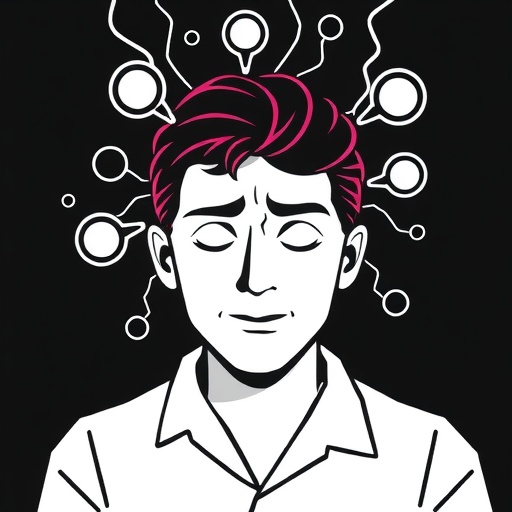In an in-depth examination of the psychological burdens faced by PhD students in China, a recent study sheds light on the intricate web of academic stress, burnout, self-criticism, and depression. This research, presented by He and Mu, reveals significant insights into how age moderates the relationships between these factors, ultimately painting a compelling picture of the challenges encountered by graduate students in the demanding academic landscape. The motivational and emotional struggles that accompany the pursuit of a doctoral degree are often overlooked, yet they wield profound implications on both individual well-being and academic success.
The increasing pressures of academia have long been a topic of interest for researchers and educators alike. The findings of this study provide essential context to understand the psychological toll that high academic expectations can extract from students. PhD candidates frequently find themselves navigating a minefield of deadlines, research demands, and the intense competition inherent in higher education. This precarious balancing act often serves as fertile ground for the development of mental health issues such as stress, burnout, and depression.
In the context of this study, “academic stress” is defined as the psychological strain that arises when the demands placed on students exceed their available coping resources. This definition highlights the discrepancy between expectations and realities in academic life, which can lead to feelings of inadequacy and low self-esteem. Factors such as increasing workloads and the pressure to maintain high academic standards can exacerbate these feelings, contributing to a steep mental health decline among many PhD students.
The concept of burnout, while commonly discussed in the workplace, has troubling implications for students as well. The relentless pursuit of academic excellence, often without sufficient rest or self-care, can lead to a state of emotional exhaustion. This phenomenon of student burnout not only signals a decline in motivation and productivity but can also cultivate a hotbed for further psychological challenges such as chronic stress and depressive symptoms. Understanding how burnout manifests within the student population is crucial for developing effective interventions.
Compounding these mental health challenges is the pervasive issue of self-criticism. The researchers argue that many PhD students internalize negative judgments about their capabilities, which can lead to self-sabotaging behaviors that perpetuate a cycle of despair. The study indicates that self-criticism acts as a mediator between stress and depressive symptoms—indicating that the harsher students are on themselves, the more likely they are to experience severe mental health issues. This relationship underscores the importance of fostering self-compassion and resilience in the academic realm.
Interestingly, the research highlights age as a significant factor in this equation. Older students, who may have more life experiences and coping resources, appear to experience these pressures differently than their younger counterparts. This moderated mediation model posits that age could potentially buffer the effects of academic stress, reducing the likelihood of burnout and depression. The findings suggest a nuanced understanding of the impact of age, warranting a re-evaluation of support systems in academic institutions that cater to a diverse range of students.
The implications of this research extend beyond individual experiences, signaling an urgent need for systemic changes within educational institutions. Universities and academic bodies must acknowledge the mental health crisis facing their students, implementing robust support mechanisms including counseling services, wellness programs, and peer support networks. Creating a culture that prioritizes mental well-being can not only alleviate the burden on students but also foster a more conducive learning environment where academic success is not achieved at the expense of health.
Moreover, addressing academic stress requires a comprehensive approach that includes educating faculty and administration about the psychological implications of their expectations and feedback. Faculty training programs may benefit from integrating mental health awareness, enabling them to better support students in their academic journeys. Open dialogues about mental health, coupled with tangible resources, can break down the stigma surrounding these issues, encouraging students to seek help when they need it most.
As the landscape of higher education continues to evolve, so must the strategies employed to support students navigating its demands. Institutions are called to recognize the unique challenges that come with pursuing a doctorate, particularly as they relate to mental health. Implementing policies that prioritize student well-being, alongside rigorous academic standards, can lead to a more holistic approach to education that champions both intellectual and emotional growth.
In conclusion, He and Mu’s research underscores the critical importance of addressing mental health issues among PhD students in China. The study’s findings illuminate key factors—academic stress, burnout, self-criticism, and the moderating role of age—offering a comprehensive framework to understand these challenges. It is incumbent upon academic institutions to heed these findings and take meaningful action to protect and promote the mental health of their students.
As scholars increasingly examine the intersection of mental health and academic performance, it is vital that the insights derived from such studies are utilized as a catalyst for change. Encouraging a cultural shift around how educational success is defined and pursued can ultimately create a healthier, more supportive academic environment for all students.
Acknowledging the psychological toll that academia can take is not just an exercise in empathy; it is a necessary step towards ensuring the success of future generations of scholars. By fostering resilience, compassion, and a balanced approach to education, institutions can inspire students to thrive both academically and personally, shaping the future of higher education for the better.
Subject of Research: Academic stress, burnout, self-criticism, and depression among Chinese PhD students.
Article Title: Under the shadow of age: a moderated mediation model of academic stress, burnout, self-criticism, and depression among Chinese PhD students.
Article References:
He, A., Mu, W. Under the shadow of age: a moderated mediation model of academic stress, burnout, self-criticism, and depression among Chinese PhD students.
High Educ (2025). https://doi.org/10.1007/s10734-025-01539-4
Image Credits: AI Generated
DOI: 10.1007/s10734-025-01539-4
Keywords: academic stress, burnout, self-criticism, depression, PhD students, mental health, higher education, age moderation, psychological well-being.




